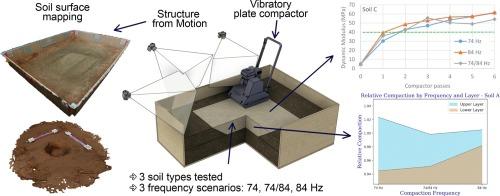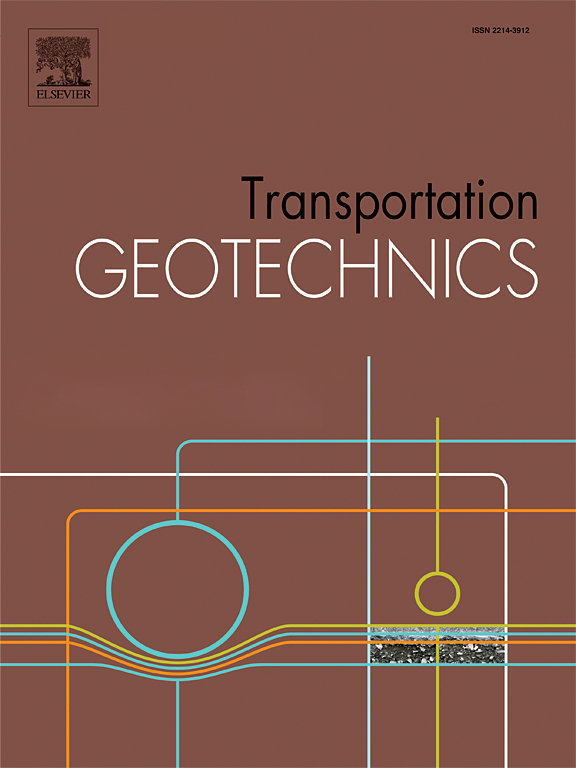提高平板压实机的效率:不同土壤类型的频率效应研究
IF 5.5
2区 工程技术
Q1 ENGINEERING, CIVIL
引用次数: 0
摘要
在这项研究中,我们在全尺寸平板压实机实验中对三种土壤类型(冰川集料混合物、闪长岩集料和砂砾石混合物)进行了压实试验,试验采用了不同的频率方案,特别是 74 赫兹和 84 赫兹之间的频率。实验方法包括通过摄影测量法测量容重,以及在不同层深度进行土壤取样。这种方法可以直接评估相对压实度(RC)。此外,还通过轻质动态板测量了压实过程中的土壤刚度。研究结果表明,较低的压实频率通常会导致地表附近的压实更加致密,而较高的压实频率则会改善较大深度的压实。此外,该研究还探讨了动态模量与 RC 之间的关系。鉴于当前技术的局限性,该研究强调了对先进、快速压实评估方法的需求。结果表明,在分析的压实频率范围内,无论选择何种频率方案,在压实机压实相同次数后,动模量和 RC 都能达到要求。因此,在保持压实目标的同时,选择较低的频率可以减少燃料消耗和设备磨损,从而提高整体效率。本文章由计算机程序翻译,如有差异,请以英文原文为准。

Enhancing plate compactor efficiency: A study on frequency effects for different soil types
In this study, compaction tests on three soil types (glacial aggregate mixture, amphibolite aggregate and sand-gravel mixture) were conducted in a full-scale plate compactor experiment under different frequency scenarios, specifically between 74 and 84 Hz. The experimental approach included measuring bulk density through photogrammetry and soil sampling at different layer depths. This methodology enabled the direct assessment of Relative Compaction (RC). Furthermore, soil stiffness was measured during compaction via a lightweight dynamic plate. Findings revealed that lower compaction frequencies generally resulted in denser compaction near the surface, while higher frequencies improved compaction at greater depths. Additionally, the study explored the relationship between dynamic modulus and RC. The study highlights the need for advanced, rapid compaction assessment methods, given the limitations of current techniques. The results indicate that within the analyzed range of compaction frequencies, both the dynamic modulus and RC requirements are achieved after the same number of compactor passes, regardless of the selected frequency scenario. Therefore, opting for a lower frequency can reduce fuel consumption and equipment wear while maintaining compaction objectives, leading to better overall efficiency.
求助全文
通过发布文献求助,成功后即可免费获取论文全文。
去求助
来源期刊

Transportation Geotechnics
Social Sciences-Transportation
CiteScore
8.10
自引率
11.30%
发文量
194
审稿时长
51 days
期刊介绍:
Transportation Geotechnics is a journal dedicated to publishing high-quality, theoretical, and applied papers that cover all facets of geotechnics for transportation infrastructure such as roads, highways, railways, underground railways, airfields, and waterways. The journal places a special emphasis on case studies that present original work relevant to the sustainable construction of transportation infrastructure. The scope of topics it addresses includes the geotechnical properties of geomaterials for sustainable and rational design and construction, the behavior of compacted and stabilized geomaterials, the use of geosynthetics and reinforcement in constructed layers and interlayers, ground improvement and slope stability for transportation infrastructures, compaction technology and management, maintenance technology, the impact of climate, embankments for highways and high-speed trains, transition zones, dredging, underwater geotechnics for infrastructure purposes, and the modeling of multi-layered structures and supporting ground under dynamic and repeated loads.
 求助内容:
求助内容: 应助结果提醒方式:
应助结果提醒方式:


